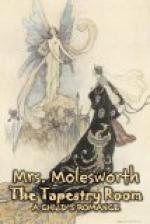“One evening—an autumn evening—mild and balmy, the two old ladies were slowly pacing up and down their favourite walk, when a servant came out to say that they were wanted—a lady was asking for them. But not to disturb them, he added, the visitor would be glad to see them in the garden, if they would allow it. Wondering who it could be, Madame and her sister were hesitating what to do, when a figure was seen approaching them from the house.
“‘I could not wait,’ she said, almost before she reached them. ’I wished so much to see you once more in the old spot, dear friends;’ and they knew her at once. They recognised in the bowed and worn but still sweet and lovely woman, their pretty child-friend of fifty years ago. She had come to bid them farewell, she said. She was on her way to the south—not to live but to die, for she had suffered much and her days were numbered.
“‘My dear husband is dead some years ago,’ she said. ’But we were very happy together, which is a blessed thought. And my children—one after another they faded. So I am an old woman now and quite alone, and I am glad to go to them all. My friends wished me to go to the south, for I have always loved the sunshine, and there my little daughter died, and perhaps death will there come to me in gentler shape. But on my way, I wished to say good-bye to you, dear friends of long ago, whom I have always loved, though we have been so little together.’
“And then they took each other’s hands, gently and quietly, the three old ladies, and softly kissed each other’s withered cheeks, down which a few tears made their way; the time was past for them for anything but gentle and chastened feelings. And whispering to their old friend not good-bye, but ‘Au revoir, au revoir in a better country,’ my ladies parted once more with their childish friend.
“She died a few months later; news of her death was sent them. They lived to be old—past eighty both of them, when they died within a few days of each other. But I never hobble up and down the terrace walk without thinking of them,” added Dudu, “and on the whole, my dears, even if I had my choice, I don’t think I should care to live another two or three hundred years in a world where changes come so quickly.”
Hugh and Jeanne were silent for a moment. Then “Thank you, dear Dudu,” they said together.
And Dudu cocked his head on one side. “There is Marcelline calling you,” he said, in a matter-of-fact tone. “Run downstairs. Take a look at the beautiful stars overhead before you go. Good-bye, my dears.”
“Good-night, Dudu, and thank you again,” said the children, as they hastened away.
They found their way back to the tapestry room without difficulty. They were standing in the middle of the room, half puzzled as to how they had got there, when Marcelline appeared.
“We have been with Dudu,” they told her, before she had time to ask them anything. “He has told us lovely stories—nicer even than fairy adventures.” And Marcelline smiled and seemed pleased, but not at all surprised.




